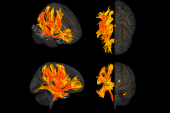Cognitive Impairment a Real Concern in HF Patients: HFSA
Poor mental acuity worsens patients’ prognosis and hinders their independence, self-care, and ability to manage their meds.

Cognitive impairment frequently coexists with heart failure, and the condition can negatively impact patients’ prognosis and hinder their independence and ability to fully participate in their care. A new scientific statement from the Heart Failure Society of America (HFSA) aims to help clinicians do their part by screening for any impairment and, when found, taking steps to address it.
Eiran Z. Gorodeski, MD (University Hospitals, Cleveland, OH), the paper’s senior author, told TCTMD the document was developed at the request of the HFSA. Their interest in the topic, which falls outside the pills, devices, and procedures that often get the most attention, validates the idea that cognitive impairment plays a key role in HF management, he commented.
“There's increasing recognition that the overwhelming majority of our patients with heart failure have some element of cognitive impairment,” Gorodeski said. In some extreme cases, this impairment is obvious, he noted, but for most patients, it’s modest and “may not be detected unless you test for it.”
Regardless of whether the impairment is invisible to clinicians or not, “it does affect what's going to happen to the patients next, their outcomes and their progress,” he said. Patients with cognitive difficulties may not understand what their physician is telling them, how to follow through on self-care, or how to handle other aspects of managing their own disease.
Moreover, now “there is extensive literature that's spanning multiple decades” about the interplay between HF and mental acuity, as well as progress in managing the dual conditions, he added.
“This is why [the paper is] timely, and the Society wanted a more definitive piece written about it to help guide clinicians in the trenches, to raise their awareness, to teach them about how to diagnose, and then to teach them about what first steps need to be taken in order to manage,” Gorodeski said.
With Parag Goyal, MD (Weill Cornell Medicine, New York, NY), as first author, the statement was published online yesterday in the Journal of Cardiac Failure.
Why the Overlap?
Patients with heart failure can develop cognitive impairment for different, complex reasons, Gorodeski said. There could be direct connection to the HF itself, he explained, “especially in patients who have more advanced heart failure where they may have low flow to the brain or very high filling pressures.” In those hospitalized for HF, some will see their behavior and mental state change after being stabilized.
Beyond this, though, a variety of CV and non-CV comorbid conditions can cause the cognitive impairment in a patient’s “complex ecosystem,” Gorodeski noted. “So for example, one of the most common ones that's underrecognized is that an overwhelming majority of patients with heart failure have sleep apnea,” a condition known to worsen cognitive functioning. Atrial fibrillation, too, has been implicated because thromboembolism can lead to subclinical infarcts in the brain that affect the patient’s ability to think clearly, and cognition can also be affected by diabetes and chronic kidney disease.
In any given patient, “you may not know what the main driver is,” he acknowledged. “But I'll be honest with you, for people like me—real-world cardiovascular clinicians who take care of patients with heart failure—I'm not a neurologist, I'm not a psychiatrist, I'm not really interested so much in the why. I'm interested in the: is it there? And if it's there, what am I going to do about it?”
Diagnosis and What Comes Next
Importantly, Gorodeski stressed, “you can't just walk into the room and look at somebody and diagnose it. . . . You shouldn't eyeball cognitive impairment.”
To this end, the HFSA scientific statement covers three options for screening: the Mini-Cog, Mini Mental State Exam, and MoCA, which stand out “for their utility, practicality, recognition/awareness, and prognostication,” the paper notes. “Tools used in routine practice should be chosen based on available time and personnel. However, clinicians should also note differences in diagnostic performance. The Mini-Cog can be administered in 3 minutes but may not be sufficiently sensitive to detect mild cognitive impairment, whereas the MoCA may be better at detecting [it], but takes 10 minutes (or longer in cognitively impaired individuals) to administer.”
But it’s also worth noting that other conditions, such as mood and sleep disorders, delirium, and sensory deficits, can mimic cognitive impairment, the authors add.
For Gorodeski, the Mini-Cog, though less sensitive, stands out for its convenience. “It's almost like checking blood pressure, [which] probably is going to take 1-and-a-half to 2 minutes. Checking cognitive impairment is probably going to take 1-and-a-half to 2 minutes,” he said.
You shouldn't eyeball cognitive impairment. Eiran Z. Gorodeski
Once cognitive impairment is identified, the statement says, it’s important to see HF management through that “prism.”
“Probably the most important thing to do about it,” said Gorodeski, “is to consider what accommodations the patient needs.”
Prior to hospital discharge, patients with decompensated HF are given a laundry list of tasks and told to take numerous medications, to weigh and document their weight every day, to eat a low-salt diet, and to return to the clinic for scheduled visits. “People with cognitive impairment can't do it. They are going to make a lot of mistakes, even though they want the best for themselves,” because the reality is their ability to learn new things, remember information, and problem solve are all weakened, Gorodeski explained.
Clinicians can accommodate for these issues, he advised, through creating awareness in the patient’s social circle that while it might not be obvious, the person has a problem with cognition because of their illness. The friend or relative can help with things like managing their pillbox and making it to appointments.
The care team also should investigate whether there are any other drivers of cognitive impairment and control those as much as possible, according to the HFSA statement.
And finally, another area to consider is how to make difficult decisions when the patient’s mental sharpness is impaired. “Given its impact on self-care and life expectancy, integrating cognitive impairment into clinical decision-making is a complex, yet critical part of caring for adults with HF and cognitive impairment,” Goyal et al write. Both advanced care planning and the choice to pursue therapies like left ventricular assist devices and heart transplantation are especially challenging in this context, though the statement offers strategies for how to communicate openly with the aim of providing patient-centered care.
Its authors note that there remain many gaps related to understanding the pathophysiological mechanisms as well as the best ways to screen for and potentially reverse cognitive impairment. “By addressing these gaps, the field has an opportunity to further improve the care provided [to] one of the most vulnerable segments of the population,” they conclude.
Caitlin E. Cox is Executive Editor of TCTMD and Associate Director, Editorial Content at the Cardiovascular Research Foundation. She produces the…
Read Full BioSources
Goyal P, Didomenico RJ, Pressler SJ, et al. Cognitive impairment in heart failure: a Heart Failure Society of America scientific statement. J Card Fail. 2024;30:488-504.
Disclosures
- Goyal is supported by a National Institute on Aging grant; was a member of the Junior Investigator Intensive Program of the US Deprescribing Research Network, which is funded by the National Institute on Aging; and has received consulting fees from Sensorum Health and personal fees for medicolegal consulting related to heart failure.
- Gorodeski reports consulting fees from Abbott, Boston Scientific, and Masimo.





Comments